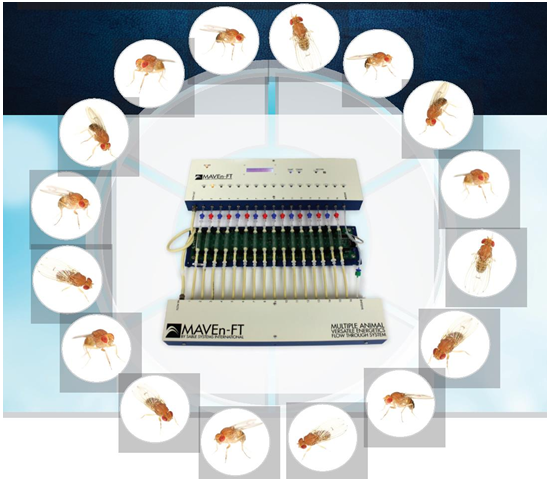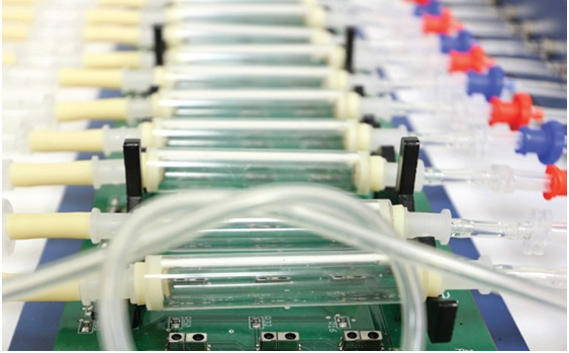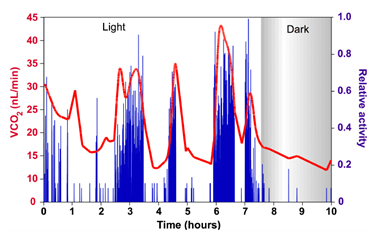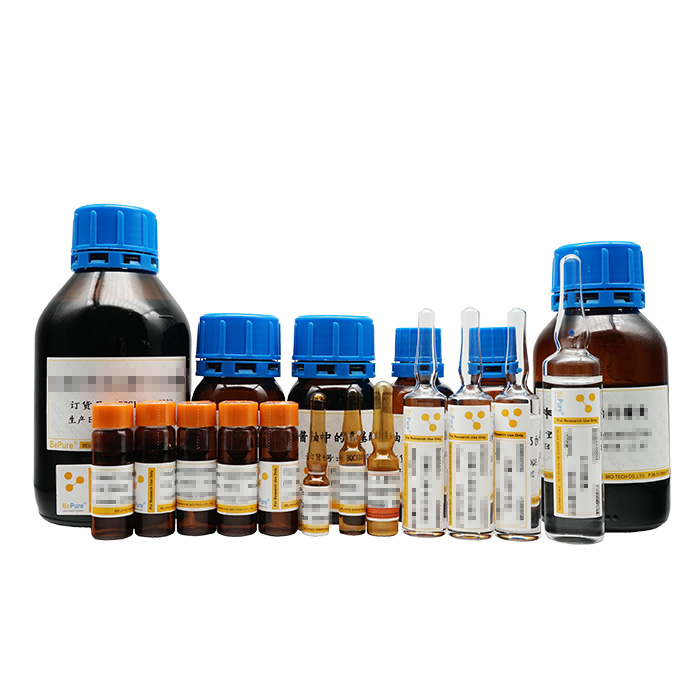- 详细介绍
#yiketai_goods table{border-collapse:collapse;border:1px solid #e9e9e9;border-spacing:0;}#yiketai_goods table td{border:1px solid #e9e9e9;padding:5px;} 果蝇作为经济实用的模式动物,可用于神经系统紊乱、炎症性病变、心血管疾病、癌症以及糖尿病等ZL研究,而这些疾病的发生从生理上来说都与生物个体长期的代谢功能异常密切相关。
MAVEn™高通量16通道果蝇代谢监测系统是由世界知名的美国Sable Systems International动物代谢测量公司生产的一款16通道、高分辨率及自动化的果蝇代谢监测仪器,可广泛用于代谢紊乱造成的各种流行疾病ZL的机理研究。

MAVEn™果蝇代谢系统作为果蝇代谢分型监测方面的权威产品,主要具备以下特点:
1. 改变了传统的单只果蝇的封闭或半封闭式测量模式,实现每个测量室都有实时气流通过的完全开放式测量,避免了测量时内出现缺氧(hypoxia)或高碳酸血症(hypercapnia),可一次测量多达16只个体。
2. 15秒就可以完成一只果蝇的代谢监测,这代表了目前技术的ZG水平。
3. 数据可以通过SD卡把带时间标签的CSV格式直接导出到电脑。
4. 可选配FLIC果蝇觅食、AD-2果蝇活动、气体(氧气、二氧化碳、水汽以及其它可检测气体)等监测单元。
5. 参考文献多,高达4万多篇,属于前沿科技。

具体性能指标:
1. 气流流速:5毫升/分钟-200毫升/分钟,质量流量计,PID精确控制,精度为2%。
2. 昆虫测量时间:15秒-3小时可程序化选择;基线测量时间:15秒-3小时可程序化选择。
3. 气压测量:分辨率1Pa,精度0.05%。
4. 光照水平:0.1-5000勒克斯。
5. 温度测量:0-50℃,分辨率0.01℃,精度±0.25℃。
6. 模拟输入:6个模拟输入,16bit分辨率,-5+5伏电压信号,可接SSI其它仪器或实验室其它气体分析仪等。
7. 数据格式:CSV格式;数据存储:SD卡,ZD支持32G的SD卡。
8.
 双通道高精度差分式氧气分析测量仪:测量技术:燃料电池原理氧气传感器,双通道;氧气浓度量程0-100%(用户可自定义设置5个级别);差值量程±50%;精度0.1%(O2浓度2-100%时);分辨率0.0001%O2;漂移< 0.01%每小时(温度恒定情况下);响应时间小于7秒;24小时漂移<0.01%;20分钟噪音<3ppm RMS;数字过滤(噪音)0-40秒可调,增幅0.2秒,内置A/D转换器分辨率16bits;温度、压力补偿;传感器温度测量范围0-60℃,精度0.2℃,分辨率0.001℃;大气压测量分辨率0.0001kPa,精度为满量程的0.05%;适用流量范围5-2000mL/min;4通道模拟信号输出(0-5V BNC)可输出通道1的氧气浓度,通道2的氧气浓度,1和2的差值,大气压;数字输出:RS-232;具4行文字LCD显示屏,带背光,可同时显示2个通道的氧气含量和它们的差值,以及大气压;独具PID(Proportional-Integral-Derivative)温控单元,保证内部氧气传感器温度恒定,进一步提高了氧气测量的精度和稳定性;供电12-24VDC,8A,配交流电适配器;工作温度:5-45℃,无冷凝;重量6.4kg;尺寸43.2cm×35.6cm×20.3cm
双通道高精度差分式氧气分析测量仪:测量技术:燃料电池原理氧气传感器,双通道;氧气浓度量程0-100%(用户可自定义设置5个级别);差值量程±50%;精度0.1%(O2浓度2-100%时);分辨率0.0001%O2;漂移< 0.01%每小时(温度恒定情况下);响应时间小于7秒;24小时漂移<0.01%;20分钟噪音<3ppm RMS;数字过滤(噪音)0-40秒可调,增幅0.2秒,内置A/D转换器分辨率16bits;温度、压力补偿;传感器温度测量范围0-60℃,精度0.2℃,分辨率0.001℃;大气压测量分辨率0.0001kPa,精度为满量程的0.05%;适用流量范围5-2000mL/min;4通道模拟信号输出(0-5V BNC)可输出通道1的氧气浓度,通道2的氧气浓度,1和2的差值,大气压;数字输出:RS-232;具4行文字LCD显示屏,带背光,可同时显示2个通道的氧气含量和它们的差值,以及大气压;独具PID(Proportional-Integral-Derivative)温控单元,保证内部氧气传感器温度恒定,进一步提高了氧气测量的精度和稳定性;供电12-24VDC,8A,配交流电适配器;工作温度:5-45℃,无冷凝;重量6.4kg;尺寸43.2cm×35.6cm×20.3cm9. 超高精度二氧化碳分析测量仪:用于测量微小昆虫(比如果蝇、蚊子等)或蜱螨类微小动物的呼吸代谢,可同时测量CO2浓度和H2O浓度;CO2量程0-3000ppm;准确度<1%;分辨率0.01ppm;H2O量程0-60mmol/mol;准确度1%;
10. 二次抽样单元:内置气泵、精密针阀、质量流量计,可用来给气流样本做二次抽样,也可单独作为气源使用;流量范围5-2000mL/min;精度为读数的10%;分辨率1mL/min;具备2行显示LCD显示屏;带0-5V BNC模拟信号输出;数字输出RS-232;供电12-15VDC,20-350mA,配交流电适配器;工作温度:0-50℃,无冷凝;重量1.5kg;尺寸16cm×13cm×20cm;
产地:美国
文献案例:
在2016年已发表的果蝇有关文献中,使用SSI果蝇代谢监测系统的达14篇,2015年11篇,截止目前相关文献共计500多篇。
1. Andrew N R, Ghaedi B, Groenewald B. The role of nest surface temperatures and the brain in influencing ant metabolic rates[J]. Journal of Thermal Biology, 2016, 60: 132-139.
2. Baaren J, Dufour C M S, Pierre J S, et al. Evolution of life‐history traits and mating strategy in males: a case study on two populations of a Drosophila parasitoid[J]. Biological Journal of the Linnean Society, 2016, 117(2): 231-240.
3. Bartholomew N R, Burdett J M, VandenBrooks J M, et al. Impaired climbing and flight behaviour in Drosophila melanogaster following carbon dioxide anaesthesia[J]. Scientific reports, 2015, 5.
4. Basson C H, Clusella-Trullas S. The behavior-physiology nexus: behavioral and physiological compensation are relied on to different extents between seasons[J]. Physiological and Biochemical Zoology, 2015, 88(4): 384-394.
5. Bosco G, Clamer M, Messulam E, et al. EFFECTS OF OXYGEN CONCENTRATION AND PRESSURE ON Drosophila melanogaster: OXIDATIVE STRESS, MITOCHONDRIAL ACTIVITY, AND SURVIVORSHIP[J]. Archives of insect biochemistry and physiology, 2015, 88(4): 222-234.
6. Casas J, Body M, Gutzwiller F, et al. Increasing metabolic rate despite declining body weight in an adult parasitoid wasp[J]. Journal of insect physiology, 2015, 79: 27-35.
7. Correa Y D C G, Faroni L R A, Haddi K, et al. Locomotory and physiological responses induced by clove and cinnamon essential oils in the maize weevil Sitophilus zeamais[J]. Pesticide biochemistry and physiology, 2015, 125: 31-37.
8. DeVries Z C, Kells S A, Appel A G. Estimating the critical thermal maximum (CT max) of bed bugs, Cimex lectularius: Comparing thermolimit respirometry with traditional visual methods[J]. Comparative Biochemistry and Physiology Part A: Molecular & Integrative Physiology, 2016, 197: 52-57.
9. Dreiss A N, Séchaud R, Béziers P, et al. Social huddling and physiological thermoregulation are related to melanism in the nocturnal barn owl[J]. Oecologia, 2016, 180(2): 371-381.
10. Duun Rohde P, Krag K, Loeschcke V, et al. A Quantitative Genomic Approach for Analysis of Fitness and Stress Related Traits in a Drosophila melanogaster Model Population[J]. International Journal of Genomics, 2016, 2016.
11. Fischer K E, Gelfond J A L, Soto V Y, et al. Health effects of long-term rapamycin treatment: the impact on mouse health of enteric rapamycin treatment from four months of age throughout life[J]. PloS one, 2015, 10(5): e0126644.
12. Groom D J E, Toledo M C B, Welch K C. Wingbeat kinematics and energetics during weightlifting in hovering hummingbirds across an elevational gradient[J]. Journal of Comparative Physiology B, 2016: 1-18.
13. Gudowska A, Boardman L, Terblanche J S. The closed spiracle phase of discontinuous gas exchange predicts diving duration in the grasshopper, Paracinema tricolor[J]. Journal of Experimental Biology, 2016: jeb. 135129.
14. Haddi K, Mendes M V, Barcellos M S, et al. Sexual Success after Stress? Imidacloprid-Induced Hormesis in Males of the Neotropical Stink Bug Euschistus heros[J]. PloS one, 2016, 11(6): e0156616.
15. Haddi K, Oliveira E E, Faroni L R A, et al. Sublethal exposure to clove and cinnamon essential oils induces hormetic-like responses and disturbs behavioral and respiratory responses in Sitophilus zeamais (Coleoptera: Curculionidae)[J]. Journal of economic entomology, 2015: tov255.
16. Horváthová T, Antol A, Czarnoleski M, et al. Does temperature and oxygen affect duration of intramarsupial development and juvenile growth in the terrestrial isopod Porcellio scaber (Crustacea, Malacostraca)?[J]. ZooKeys, 2015 (515): 67.
17. Kivelä S M, Lehmann P, Gotthard K. Do respiratory limitations affect metabolism of insect larvae before moulting: an empirical test at the individual level[J]. Journal of Experimental Biology, 2016: jeb. 140442.
18. Lebeau J, Wesselingh R A, Van Dyck H. Nectar resource limitation affects butterfly flight performance and metabolism differently in intensive and extensive agricultural landscapes[C]//Proc. R. Soc. B. The Royal Society, 2016, 283(1830): 20160455.
19. MacMillan H A, Schou M F, Kristensen T N, et al. Preservation of potassium balance is strongly associated with insect cold tolerance in the field: a seasonal study of Drosophila subobscura[J]. Biology letters, 2016, 12(5): 20160123.
20. Meyers P J, Powell T H Q, Walden K K O, et al. Divergence of the diapause transcriptome in apple maggot flies: winter regulation and post-winter transcriptional repression[J]. Journal of Experimental Biology, 2016: jeb. 140566.
21. Plavšin I, Stašková T, Šerý M, et al. Hormonal enhancement of insecticide efficacy in Tribolium castaneum: Oxidative stress and metabolic aspects[J]. Comparative Biochemistry and Physiology Part C: Toxicology & Pharmacology, 2015, 170: 19-27.
22. Rodrigues C G, Krüger A P, Barbosa W F, et al. Leaf Fertilizers Affect Survival and Behavior of the Neotropical Stingless Bee Friesella schrottkyi (Meliponini: Apidae: Hymenoptera)[J]. Journal of economic entomology, 2016, 109(3): 1001-1008.
23. Thienel M, Canals M, Bozinovic F, et al. The effects of temperature on the gas exchange cycle in Agathemera crassa[J]. Comparative Biochemistry and Physiology Part A: Molecular & Integrative Physiology, 2015, 183: 126-130.
24. Williams C M, Chick W D, Sinclair B J. A cross‐seasonal perspective on local adaptation: metabolic plasticity mediates responses to winter in a thermal‐generalist moth[J]. Functional Ecology, 2015, 29(4): 549-561.
25. Williams C M, Szejner-Sigal A, Morgan T J, et al. Adaptation to Low Temperature Exposure Increases Metabolic Rates Independently of Growth Rates[J]. Integrative and comparative biology, 2016: icw009.







 VIP会员
VIP会员

 粤公网安备44196802000105号
粤公网安备44196802000105号